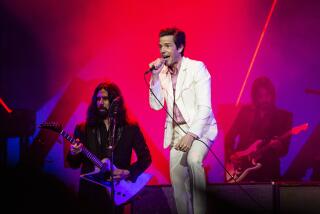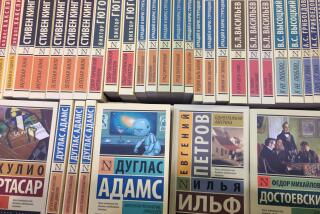Valley Youths Get an Earful of Heavy Metal <i> Glasnost</i>
- Share via
Birmingham High School students got a blast of glasnost Tuesday from a Soviet rock band that is touring the United States to promote cultural exchange and, on this day at least, to engage in a bit of old-fashioned capitalism by promoting its new album.
Four members of Gorky Park, a band that played with U.S. heavy metal favorites Motley Crue, Bon Jovi and Ozzy Osbourne at the Moscow Music Peace Festival in August, performed one song and showed videos of several more for 500 enthusiastic students at the Van Nuys high school.
The band is the first Soviet group under contract to a U.S. recording company.
“I don’t even like rock--I listen to rap--but these guys are great,” said Jay Mamaghani, a Birmingham ninth-grader, echoing the sentiments of many of those in the crowd.
Members of the group told students that rock music can overcome many of the barriers that have separated U.S. and Soviet citizens.
“Nobody ever hated the American people in Russia; it was all propaganda,” said band member Alexei Belov. He drew the largest round of applause from the students when he explained the similarities between the two countries by noting that “people are the same, they make love the same all over the world.”
The event, billed as a cultural exchange, also had an anti-drug message with band member Belov warning the students to stay away from drugs and alcohol.
The band members have apparently learned a lot from exchanges with their U.S. counterparts. They arrived by limousine, had long hair, wore lots of black leather and hailed the Beatles and Led Zeppelin as the greatest rock bands ever.
Lead singer Nickolai Noskov was a no-show: He was asleep back at the hotel during the 1 p.m. performance, band members said.
Even though the group plays a hard-edged brand of rock, it performed for the students a 500-year-old traditional Russian folk song called “Oh Frost.” The electric guitars were being reserved for a show Tuesday night at a local nightclub, band members said.
The group showed a video of members performing a remake of the 1960s song “My Generation,” originally by The Who. “The feelings that they were singing about 25 years ago is what started happening in Russia five years ago,” Belov said.
It was then that Belov and fellow Gorky Park musicians were able to emerge from underground rock clubs and no longer risk arrest for playing the type of rock music that until recently was banned by authorities, Belov said.
Belov, the group’s lead guitarist and a classically trained violinist, said he was arrested several times for performing in “unofficial bands” before restrictions were eased under Soviet leader Mikhail Gorbachev’s glasnost policy. The band gives thanks to Gorbachev in a message on the cover of its PolyGram album entitled “Gorky Park.”
Glasnost has also had an economic impact. In past years, popular musicians employed by Soviet authorities earned only a small salary and no royalties for their work, Belov said.
“Now we make as much in one concert in Russia as a regular guy makes in eight years,” Belov said.
More to Read
The biggest entertainment stories
Get our big stories about Hollywood, film, television, music, arts, culture and more right in your inbox as soon as they publish.
You may occasionally receive promotional content from the Los Angeles Times.










